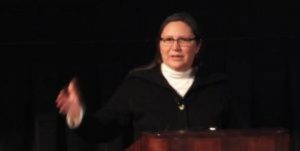
Rosalyn LaPier is a writer, ethnobotanist, and environmental historian, as well as an enrolled member of the Blackfeet Tribe of Montana and Métis. She is on the National Steering Committee of the March for science. She is a visiting professor at Harvard Divinity School and an associate professor of environmental studies at the University of Montana.
Harvard Political Review: On April 22, 2017, people across the country will take to the streets as a part of the March for Science. Why are they protesting?
Rosalyn LaPier: I would argue the March for Science is not necessarily a “protest,” but a march that is for science. We are advocating for something, not protesting against something. The March is about bringing together scientists, people who are science educators, people who are interested in science, and citizens who are impacted by science in their everyday lives. It’s to bring people together to advocate, or continue to advocate, for science in our American democracy.
HPR: The Atlantic counts 21 distinct goals for the March outlined in texts published by the organizers, ranging from celebrating science to increasing its diversity. How do you balance so many different ideas into one protest movement?
RL: I would distill it all down to one thing, which is that the March for Science is advocating for science. I know that there are a lot of ideas on the list. We update our website almost on a daily basis, so if you visit day-to-day, there is going to be something new that we have added. There’s always going to be something new added to that list. The most important thing is to make sure that science stays on the agenda of not only public policy makers in Washington D.C., but also in citizens’ minds as to the importance of science in everyday life.
HPR: Some scientists, including Robert Young at the New York Times, have described the March as “[politicizing] the science we care so much about.” How do you respond to this criticism?
RL: I would say that science plays many roles in society; it definitely plays many roles in a democratic society. It is impossible to be completely apolitical, but I think that science is nonpartisan. There really is a difference between being not partisan and being political. This is something I run into personally when I work with people in Washington D.C. related to issues that are in Native American communities and environmental justice issues. I always remind anybody I talk to in Congress or in D.C. that Native American issues or environmental justice issues or environmental issues are not partisan issues. Those are issues that impact everybody.
If you are being impacted by unclean water, it’s not a political issue. It’s whether the water is clean or unclean. I think that folks who are working to address those issues – scientists who are working to address those issues, but also citizens who are working to address those issues – don’t view science as political. They view it as nonpartisan. But they do view it as part of the world that we live in.
HPR: The March for Science follows on the heels of the Women’s March earlier this year. Why in the time of social media do you think the march remains a potent form of protest?
RL: People like to get together; that’s the basic answer. As humans, we like to be able to have our voices be heard, but we also enjoy making something, such as advocating for science or advocating for any issue, into a social occasion that can then turn into a social movement. It’s very hard, especially in cyberspace, to get a sense of if something is becoming a social movement. It’s hard to see the numbers out there.
It’s a lot easier when you have a lot of people coming together around a particular cause or a particular issue. One of the things that we saw with the Women’s March, because they had the satellite marches as well, is you saw the number of people that were in D.C. who were supporting that concern, but you also saw the satellite marches, and you saw that there was this collective action that was occurring across the United States that helps people then view their position or their stance collectively, and not as individuals.





